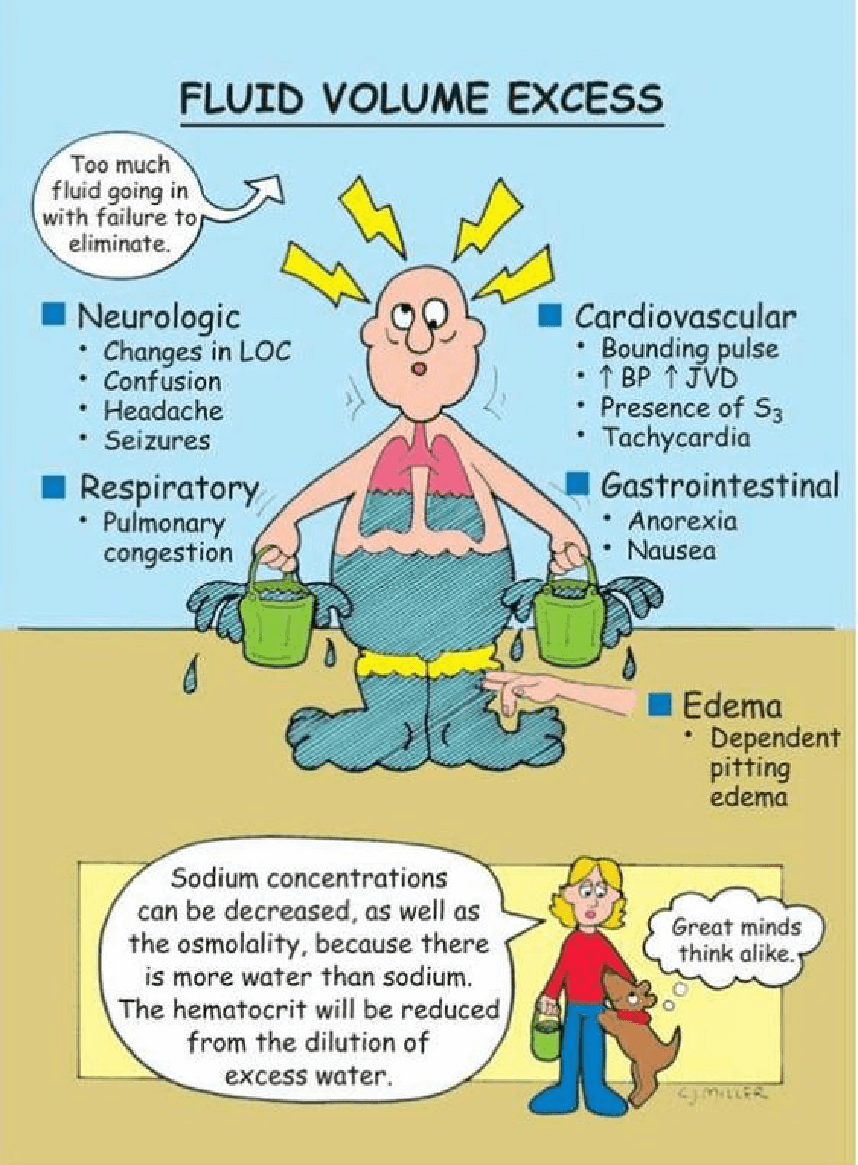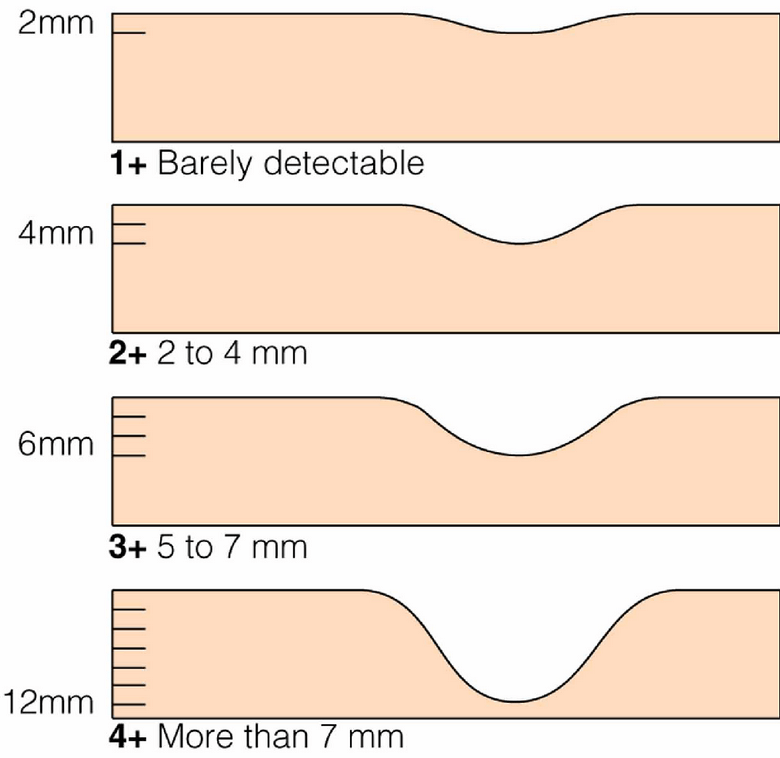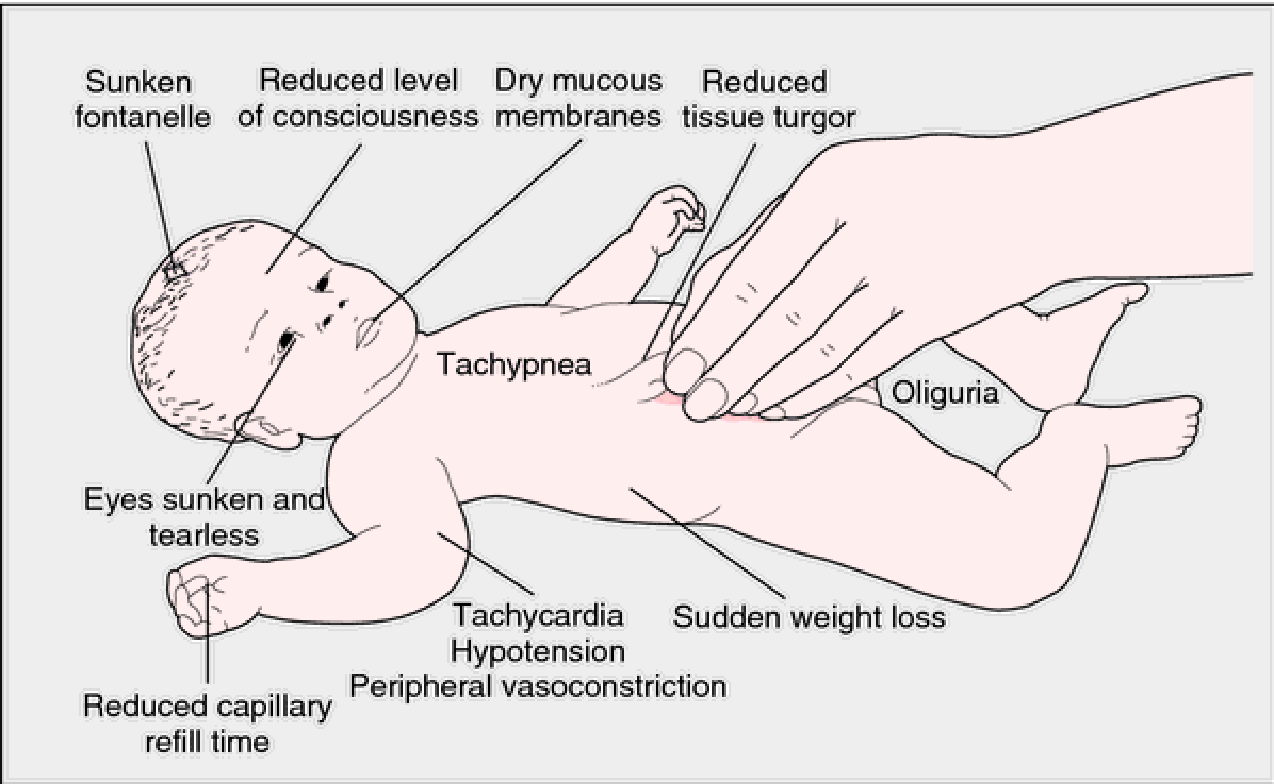Factors Affecting Body Fluid, Electrolyte Fluid Imbalances
Dehydration
-
Hyper-osmolar loss of only water leaving the client with excess sodium
Overhydration
-
Hypo-osmolar gain of only water leaving low osmolality and low serum sodium levels
Fluid volume overload
-
Bounding pulse
-
Distended neck & peripheral veins
-
Dyspnea; orthopnea
-
Pulmonary edema
-
Polyuria
-
Peripheral edema
-
Possible cerebral edema.

Figure 52-11: Evaluation of edema. B, Four-point scale for grading edema.

Fluid Volume Deficit
-
Poor skin turgor is associated with decreased urine output.
-
Sunken eyes In infants, sunken fontanels:
-
Low blood pressure Rapid heartbeat Rapid breathing
-
No tears when crying
-
Fever

Nursing Test Bank
Quiz #1: RN Exams Pharmacology Exams
Quiz #2: RN Exams Medical-Surgical Exams
Quiz #3: RN Exams Fundamentals Exams
Quiz #4: RN Exams Maternal-Newborn Exams
Quiz #5: RN Exams Anatomy and Physiology Exams
Quiz #6: RN Exams Obstetrics and Pediatrics Exams
Quiz #7: RN Exams Fluid and Electrolytes Exams
Quiz #8: RN Exams Community Health Exams
Quiz #9: RN Exams Promoting Health across the lifespan Exams
Quiz #10: RN Exams Multidimensional care Exams
Naxlex Comprehensive Predictor Exams
Quiz #1: Naxlex RN Comprehensive online practice 2019 B with NGN
Quiz #2: Naxlex RN Comprehensive Predictor 2023
Quiz #3: Naxlex RN Comprehensive Predictor 2023 Exit Exam A
Quiz #4: Naxlex HESI Exit LPN Exam
Quiz #5: Naxlex PN Comprehensive Predictor PN 2020
Quiz #6: Naxlex VATI PN Comprehensive Predictor 2020
Quiz #8: Naxlex PN Comprehensive Predictor 2023 - Exam 1
Quiz #10: Naxlex HESI PN Exit exam
Quiz #11: Naxlex HESI PN EXIT Exam 2
Questions on Factors Affecting Body Fluid, Electrolyte Fluid Imbalances
Correct Answer is B
Explanation
<p>Increased capillary refill time is a finding of dehydration, as it indicates that the blood flow to the peripheral tissues is impaired due to low blood volume. Capillary refill time is the time it takes for the color to return to the nail bed after applying pressure. Normal capillary refill time is less than 3 seconds. When the body is dehydrated, the blood pressure drops and the heart rate increases to maintain adequate perfusion to vital organs, resulting in longer capillary refill time.</p>
Correct Answer is ["A","B","C","D"]
Explanation
<p>Encouraging ambulation is not an appropriate intervention for a client who has overhydration because it may worsen the fluid overload and increase the risk of complications such as heart failure, pulmonary edema, or cerebral edema. The nurse should limit the client's physical activity and provide rest periods to conserve energy and reduce oxygen demand.</p>
Correct Answer is D
Explanation
<p>Using herbs and spices instead of salt to season food is the best dietary modification for a client who has fluid volume overload. This would help reduce the sodium intake and prevent or decrease fluid retention in the body. Herbs and spices can also add flavor and variety to the diet without adding calories or fat. Some examples of herbs and spices that can be used instead of salt are garlic, onion, ginger, basil, oregano, rosemary, thyme, parsley, cilantro, mint, lemon, lime, vinegar, pepper, chili, cumin, curry, turmeric, paprika, cinnamon, nutmeg, and cloves.</p>
<p>Raise the client's legs. This is not the correct answer because raising the client's legs can worsen fluid overload by increasing venous return to the heart and lungs. The nurse should avoid this position for clients who have crackles in the lungs, dyspnea, and increased blood pressure, a
<p>Urine specific gravity 1.005 is a sign of overhydration. Urine specific gravity measures the concentration of urine compared to water. Normal urine specific gravity ranges from 1.010 to 1.030. Overhydration causes urine specific gravity to decrease because of the excess water in the urine. This i
Search Here
Related Topics
- Effects of Immobility on Body Systems - Fluid and Electrolytes
- Assessment and Prevention of Immobility Complications - Fluid and Electrolytes
- Positioning Techniques - Fluid and Electrolytes
- Mobilization and Safe Transfer Techniques - Fluid and Electrolytes
- Collaborative Care - Fluid and Electrolytes
- Critical Thinking - Fluid and Electrolytes
More on Nursing
- Mobility, Immobility and Positioning
- Critical Thinking and Nursing Process
- Oxygen Therapy and Respiratory Care (Oxygenation and Perfusion)
- Care of Patients with Chronic Illnesses
- Patient Assessment and Documentation
- End-of-life Care and Palliative Care
- Vital Signs Measurement
- Safety Fall
- Skin integrity and Basic wound care and dressing changes
- Nursing Ethics and Professionalism
Free Nursing Study Materials
Access to all study guides and practice questions for nursing for free.
- Free Nursing Study Trials
- Free Nursing Video tutorials
- Free Nursing Practice Tests
- Free Exam and Study Modes
- Free Nursing Revision Quizlets
